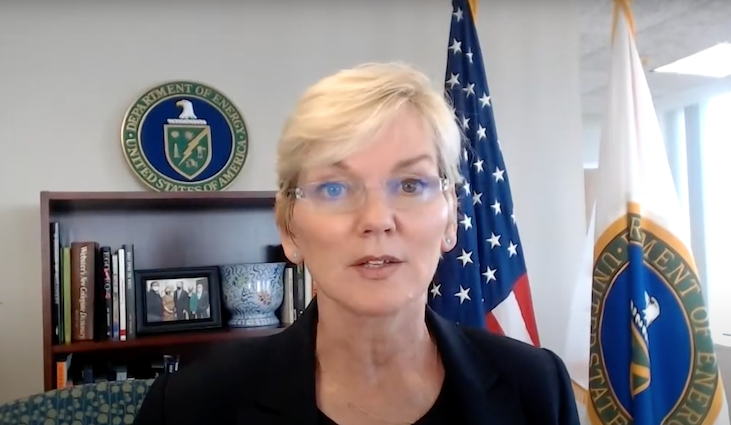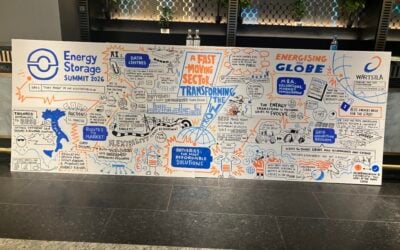
The US government Department of Energy (DoE) has issued a Request for Information (RFI) as it prepares to rollout a package worth more than half a billion dollars to support the development and commercialisation of long-duration energy storage (LDES).
Through the Bipartisan Infrastructure Law which was passed in November 2021 to help fund critical investments in US infrastructure, the DoE is putting up funding worth US$505 million towards the Long Duration Energy Storage for Everyone, Everywhere Initiative (LD ESEE).
The DoE has been funding research into long-duration storage technologies for years but has stepped up its work in the area in the past couple, including the launch of an Energy Storage Grand Challenge competitive funding opportunity for LDES technology providers.
That happened during the latter days of the Trump era, but with energy secretary Jennifer Granholm having highlighted the potential of LDES including flow batteries, the government has made various other commitments including the start of construction on a US$75 million R&D centre at Pacific Northwest National Laboratory (PNNL).
Try Premium for just $1
- Full premium access for the first month at only $1
- Converts to an annual rate after 30 days unless cancelled
- Cancel anytime during the trial period
Premium Benefits
- Expert industry analysis and interviews
- Digital access to PV Tech Power journal
- Exclusive event discounts
Or get the full Premium subscription right away
Or continue reading this article for free
The DoE is now seeking public input on the aims and administration of the US$505 million funding, opening its RFI from 12 May to 16 June 2022.
The funding covers three separate demonstration programmes: general energy storage demonstration projects, grants for pilot projects and specific long-duration demonstrations.
During the four-year period from fiscal year 2022 to the end of fiscal year 2025, the funds will be appropriated through the infrastructure law to support the development of LDES demonstrations which can validate new technologies and enable the effective deployment of energy storage.
The Biden Administration has recognised the essential role of energy storage in enabling a carbon-free electric grid by 2035 and full decarbonisation of the economy by 2050, the DoE said.
The full RFI document can be seen here.
Corporates can make a difference
Elsewhere, the role of corporate energy buyers in accelerating the decarbonisation of grids around the world was brought to the fore in a new report published by the Long Duration Energy Storage Council (LDES Council) and McKinsey.
The report examines how corporate power purchase agreements (PPAs) need to move towards enabling the 24/7 use of renewable energy. Without this, real decarbonisation is not possible, and round-the-clock renewables will not be possible without LDES, the report argues.
24/7 clean power PPAs measure hourly use of electricity as well as greenhouse gas (GHG) emissions, enabling customers to match their power consumption with renewable energy generated in near real-time.
However, most corporate PPAs today simply match that supply and demand over annualised averages, which the authors claim only achieves decarbonisation of 40% to 70%.
In other words, while today’s corporate PPAs allow for increased shares of renewable energy to be used, there’s a fixed limit on how much emissions reduction benefit they can offer.
While lithium-ion may be prohibitively expensive to use in such a way, new alternative technologies for energy storage could hit the spot, the report said. It claimed that while the levelised cost of electricity from a solar or wind hybrid Li-ion battery storage system currently exceeds US$200/MWh in most regions, a scale-up in deployment of LDES could offer a levelised cost of renewably-generated electricity of less than US$100/MWh “in the near future”.
However, there are barriers in place to prevent widespread use of 24/7 clean power PPAs.
These include a lack of industry-agreed definitions of what the PPAs should look like and the significant ‘chicken and egg’ problem that LDES costs will reduce with scale, but cost reductions are generally the biggest driver of demand – which in turn creates scale.
The report, was written by McKinsey for LDES Council, and is the second in a series of reports the consultancy is writing for it. The first report argued that a massive rollout of LDES will lead to much lower electricity system costs the world over and enable renewable energy to form the bulk of electrons carried on those systems, but also said that the technologies need support to achieve required cost reductions of about 60% by 2030.
The new report recommends that an internationally standardised PPA framework should be in place and overseen by an independent governance body.
It also suggests incentives should be in place to encourage 24/7 clean power PPAs, such as including them in carbon accounting standards. There should also be transparency of data around the topic, while specific regulations should be created to eliminate barriers and catalyse deployment, as well as finding measures to lower barriers to corporate 24/7 renewable energy procurement for smaller businesses.
LDES Council was launched at last year’s COP26 talks and is a trade association led by the CEOs of various stakeholders, from long-duration energy storage technology providers to a number of influential corporate energy buyers, including Microsoft and Google.
The organisation recently unveiled its first board of directors. Julia Souder, formerly of the Long Duration Energy Storage Association of California (LDESAC), was appointed as executive director.
The full report can be viewed here.





